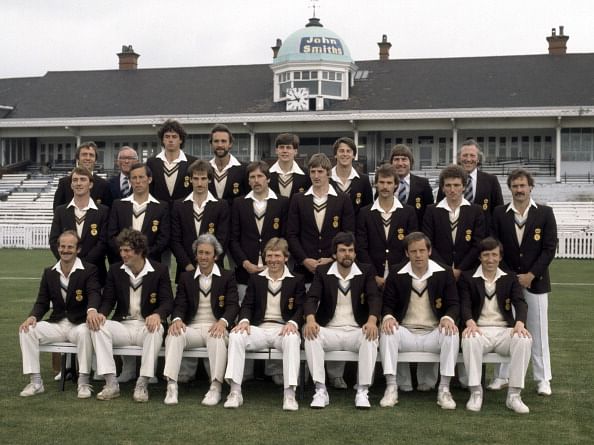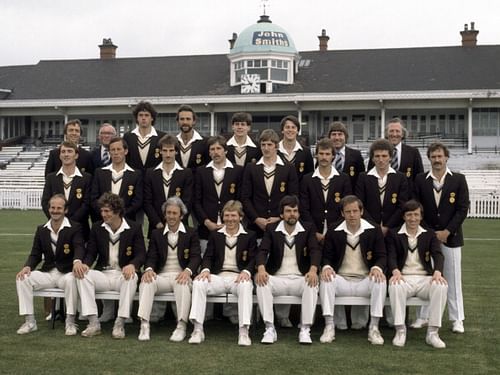
An interview with former Derbyshire batsman Alan Hill - Part 1

Alan Hill was a cricketer's cricketer, one perhaps best appreciated by the aficionados of the game as well as his teammates.
Not for him the flamboyant twenty-ball fifty that has made others of a more recent vintage wealthy beyond their dreams. Alan was more about the century duly completed just before the end of the day. An innings compiled at a steady 30, 30, 40 runs per session, as he built – no, crafted - an innings and ensured that his own side's total would give the bowlers something to work with.
In style, he was very much a man of the area of his birth. Rough-hewn, like the High Peak itself and with nothing especially fancy, he followed in a tradition of obduracy that had been observed by most Derbyshire openers over the years. There were a few more flamboyant types, Arnold Hamer and Kim Barnett the most obvious, but others valued their wicket and lost it with the reluctance of a miser handing over a shilling to a charity box. Thus, Alan followed such names as Harry Storer, Albert Alderman, Charlie Elliott and Ian Hall into the Derbyshire cricketing pantheon. And, on record, he was better than all of them.
I watched him many times and I saw myself in him. He was so much better, of course, but as an opening batsman of similar, dare I say attritional style, I empathised with Alan. While others around me were, perhaps on occasion, wanting him to go early so that we could all enjoy the latest edition of the Wright and Kirsten show, I always enjoyed his battles with fast and seam bowling of a stature that had never been seen before in county cricket and never has been since.
Nor will it again, because of the congested international cricket calendar. Alan opened the Derbyshire batting against county sides where almost every team had a lightning quick overseas fast bowler. Sussex had the silky smooth Imran Khan AND the strapping Garth Le Roux to keep you hopping around at either end. There was no respite in such games, nowhere to hide. Only the brave survived.
There were the silky quicks, like Michael Holding, Malcolm Marshall, Dennis Lillee and Richard Hadlee; the powerful ones, like Wayne Daniel, Mike Procter and Andy Roberts; the quick and sometimes erratic ones, like Greg Armstrong, Jeff Thomson and Colin Croft. Plus the downright nasty ones, like Sylvester Clarke. You needed to be alert, have a sound technique and be brave to tackle these bowlers. You had to be a good player to make consistent runs against them at the top of the order.
Alan Hill was just that. He scored over 12,000 runs at an average of 31, with eighteen centuries and sixty-five fifties. He also had four one-day centuries and a good number of half-centuries, to destroy the myth that he was a one-trick pony. He was the Derbyshire Boycott and we loved him for that. Let's face it, there are many worse names to be compared to.
He retired in 1986 at the age of just 36, having just scored 1400 runs in his most prolific season of many. Of course, I was going to ask him about that, but I had plenty of other questions in my head. He was expecting one about the catch at Lords in 1981, and about the century he scored in South Africa without a single boundary, one of only two occasions that has ever been done at first-class level. But I hope a few of the others were different and gave him cause to think.
He was patient, friendly and accommodating as we sat by the tea room at Derby, talking while we watched Leicestershire wickets fall like the flakes of an early winter snow shower in the season's last game. I could see why his reputation as a coach is high and his insight into the mind of a professional cricketer was fascinating, as were his comments on the first-class game in what he rightly called the 'golden age' of county cricket.
It is hard to argue. He played while I watched the most liberal scattering of the world's greatest cricketers that the county game has ever known, or ever will know. You can watch the IPL now and see some of the world's best compacted into a twenty-over thrash. You could watch it then and see the greatest of batsmen craft centuries of sublime skill, while the finest of bowlers tried alternately to knock their heads off or get them out with bowling of rare cunning and technique. If you survived, there were plenty of quality spin bowlers out there too, so relaxation having seen off the new ball wasn't an option. It lasted all summer long.
Alan Hill played with and against these players and more than held his own. In the intervening period, when Derbyshire batting sides have on occasion shown the resilience of a papier mache house, I've heard people say many times that they'd give a lot to have another 'Bud' Hill in the line-up.
I've been one of them, and it was a pleasure to spend time with one of my cricket heroes. I would like to thank him for his willingness to chat, and I hope that what follows does him justice.
Alan, you were from Buxworth - tell me about your early life
I grew up in a cricket-mad family. My father loved his football, but he liked cricket too. He was a decent player and represented the Royal Navy, besides being a good batsman for Buxworth over many seasons. He was the only rating to get into the navy side – the rest were all officers, so it was quite an achievement.
He gave me my competitive edge. He didn't like losing, though if it happened he took it with good grace, but he instilled in me the belief that you win if you can; if you can't, stop the opposition from doing so, as there is honour in a draw. That got me through my professional career, and I think it is a worthwhile attitude for any cricketer to have.
When did you get started on cricket?
Our house looked out onto the cricket and football fields in the village, and I spent 90% of my free time on that as a youngster. I spent hours outside with my older brother Bernard, who was on the Derbyshire staff for a year and also played professional football for Liverpool. The bulk of our practice was bowling and batting to one another, for hour after hour.
Modern ideas are that to be an elite cricketer you should have practised for around ten thousand hours – well, Bernard and I did that, on the road outside the house, using a sledge as a wicket and moving it if a car came up the road. We would be out every night after school, using a tennis ball and learning to play straight, as otherwise you were out quickly or lost time chasing it.
The great Garfield Sobers said that it was the best way to learn, as you need to play off the back foot and you don't get hurt – key factors for a budding player.